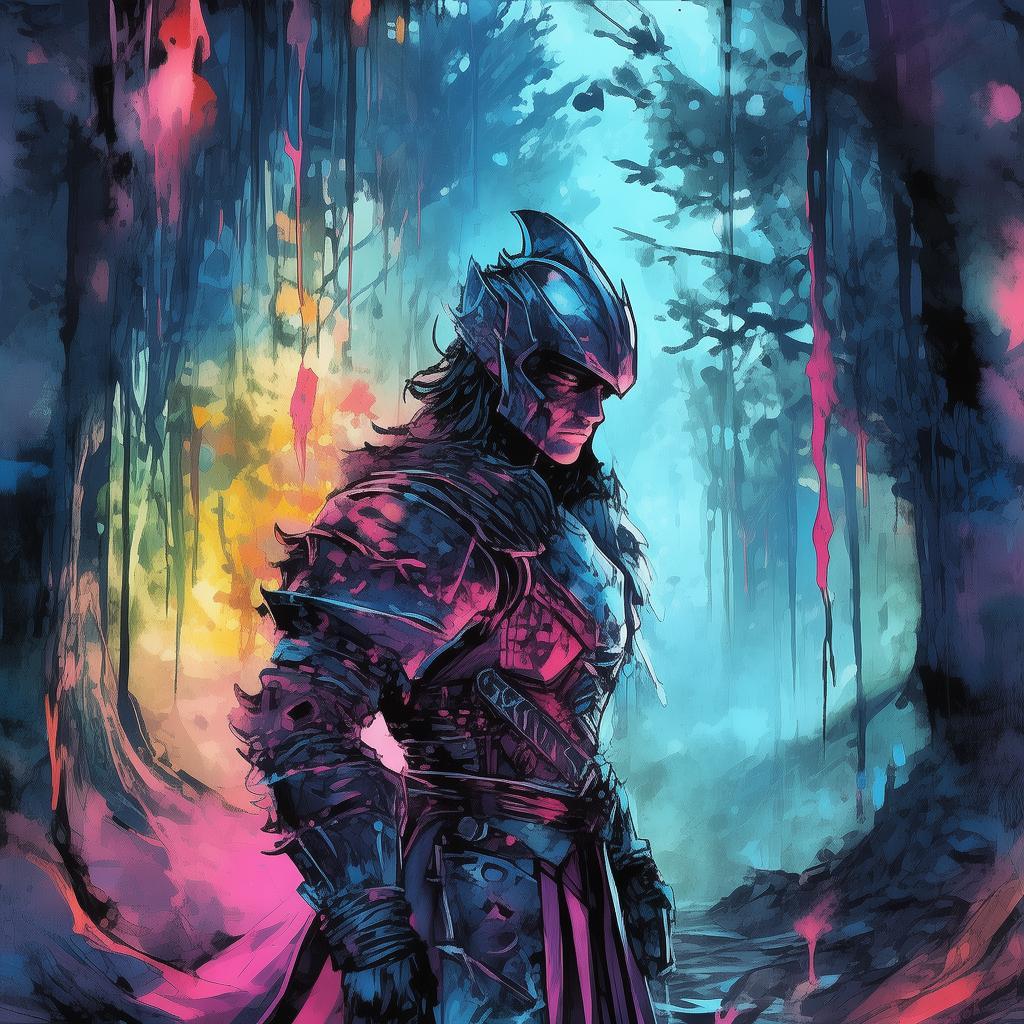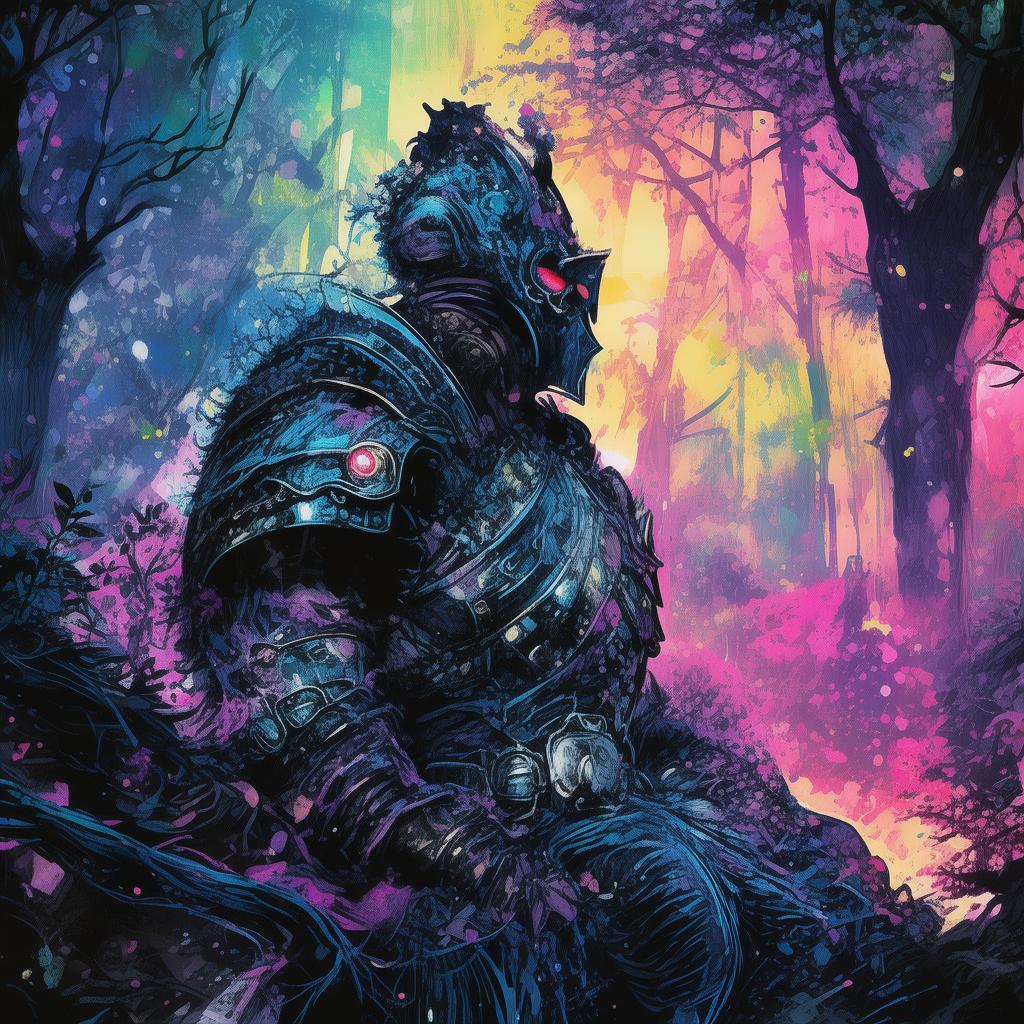The Luminous Tomb: A Miao's Journey to the Afterlife
In the remote mountains of Guizhou, China, there lay a small Miao village shrouded in mist and steeped in tradition. The villagers spoke a language of their own, danced in rituals that spoke of the afterlife, and revered the spirits that watched over them. Among them was the village elder, known for his wisdom and connection to the ancient ways.
One evening, as the sun dipped below the horizon, casting a golden glow over the rice terraces, a tragedy befell the village. A young girl named Li, the daughter of a humble farmer named Hua, vanished without a trace. The villagers searched the surrounding hills and streams, but Li’s disappearance remained a mystery.
Hua, a man of simple faith, turned to the village elder for guidance. The elder, with a furrowed brow and eyes that seemed to pierce through the veil of the afterlife, listened intently to Hua’s tale of loss. After a moment of deep contemplation, he spoke of a luminous tomb, hidden deep within the forest, that was said to be the gateway to the afterlife. It was there, he said, that the spirits would reveal the truth about Li’s fate.
Hua, driven by a father’s desperate love and a deep-seated belief in the supernatural, decided to embark on a journey to the luminous tomb. He gathered the necessary offerings and set out at dawn, his heart heavy with sorrow and his mind filled with questions.
The path to the tomb was treacherous, winding through dense forests and over rugged terrain. Hua encountered spirits that whispered in the wind, and animals that seemed to guide him with their eyes. As he ventured deeper, the forest grew darker, and the air grew colder. He felt the weight of the afterlife pressing down on him, a weight that grew heavier with each step.
After days of walking, Hua reached the entrance of the luminous tomb. It was a cave, its mouth aglow with a soft, ethereal light. He stepped inside, and the cave opened up into a vast chamber, filled with the glow of countless lanterns that seemed to float in the air. The walls were adorned with intricate carvings of Miao ancestors and spirits, and the air was thick with the scent of incense.
Hua’s journey was not without peril. He encountered guardians of the tomb, spirits that tested his resolve and his faith. They appeared as shadows and shapes, their voices a mix of wind and whisper. One spirit, a woman with eyes like stars, questioned Hua’s worthiness to enter the afterlife. “Why do you seek the truth?” she asked. “Is it for your daughter, or for yourself?”
Hua’s answer was simple yet profound. “I seek the truth for my daughter. I must know if she is safe, and if there is a way to bring her back.”
The spirit nodded, her eyes softening. “Then you are worthy.” She led him to the heart of the tomb, where a grand altar stood, and upon it lay a scroll, covered in ancient Miao script.
Hua approached the altar, his heart pounding. He unrolled the scroll, and the words began to glow, revealing the truth about Li’s fate. It was not a spirit that had taken her, but a curse, a curse that had been cast upon the village generations ago. The spirit of an ancient Miao princess, betrayed and wronged, had cursed the village, promising that the next child born to a Miao family would be taken by the spirits.
Hua realized that Li was the chosen one, and the luminous tomb was the key to breaking the curse. He had to perform a ritual, a ritual that would require the sacrifice of a virgin, and the blood of the Miao people. The spirit of the princess had been bound to the village, and only through this ritual could she be freed.

Hua returned to the village, his heart heavy with the knowledge of what he must do. He gathered the villagers and explained the ritual, asking for their consent. Many were terrified, but Hua’s resolve was unwavering. He knew that this was the only way to save his daughter and free the village from the curse.
The ritual was performed under the watchful eyes of the spirits, and as the blood was shed and the incense smoked, the luminous tomb began to glow brighter than ever before. The spirit of the princess appeared, her form shimmering with light. She thanked Hua for his courage and his love, and with a final, radiant burst, she vanished.
Li was found, alive and well, in the forest, having been taken by the spirits to a place of healing. The village was freed from the curse, and the luminous tomb became a place of reverence, a testament to the power of love and the enduring spirit of the Miao people.
Hua and Li returned to their village, their lives forever changed by the journey to the luminous tomb. The villagers celebrated, their hearts filled with gratitude and a renewed sense of community. The luminous tomb remained a beacon of hope, a reminder that even in the darkest of times, there is always a light to guide us home.
✨ Original Statement ✨
All articles published on this website (including but not limited to text, images, videos, and other content) are original or authorized for reposting and are protected by relevant laws. Without the explicit written permission of this website, no individual or organization may copy, modify, repost, or use the content for commercial purposes.
If you need to quote or cooperate, please contact this site for authorization. We reserve the right to pursue legal responsibility for any unauthorized use.
Hereby declared.









